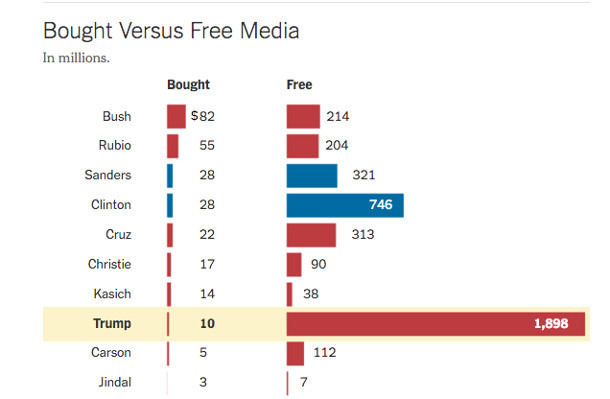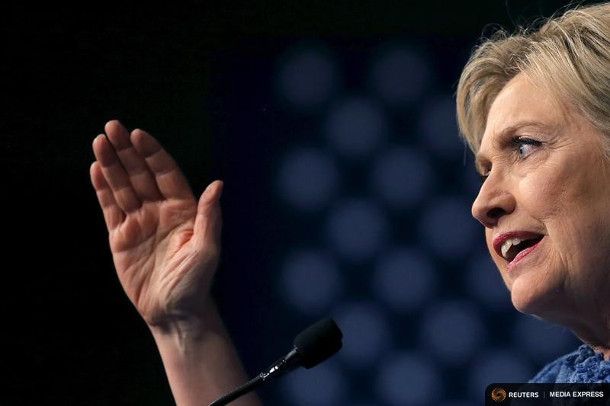Here we are in late March and it's increasingly likely the presidential race will be between Hillary Clinton and Donald Trump. This isn't to say Bernie Sanders couldn't grind out a win, or that the GOP elders couldn't pull shenanigans at the convention, but as of now, two candidates with the worst favourability ratings in over a generation are poised to be the final options for the most consequential job in the entire world. How did we get here?
First, an important point of clarification. Hillary Clinton's candidacy is not in the same class as Trump's in terms of media coverage or media cynicism. While she has received over two times more coverage than Sanders, she's also received 40 per cent as much as Trump -- much of it negative. She is a high-profile frontrunner with a nominally appealing resume for the job at hand. Still, there are some parallels with how the two candidates' media saturation helped propel them into the frontrunner status from which they have never looked back.
The invisible primary
The "invisible primary" is broadly defined as a candidate's ability to raise money, win over party leaders and generate media coverage all before any campaigning -- to say nothing of voting -- takes place. Clinton, as a former first lady, senator and high-profile secretary of state, won this primary hands down.
This created an incumbency bias based largely on criteria the Sanders campaign was expressly running against: money and establishment politics. By focusing on funds raised, the invisible primary heavily favours the former, and by racking up superdelegates, it heavily favours the latter -- all in a process that is, by design, undemocratic. The psychological effect of Clinton's delegate lead was seen in delegate totals the media echoed all throughout February and March that gave the reader the impression Clinton was up seven to one rather than even or slightly ahead.
Clinton's ability to rack up large fundraising totals via Wall Street and Hollywood bundlers and super PACs was thought to be too great -- until Sanders' insurgent candidacy ignited small donors to help propel him to comparable totals. The media coverage followed this, whereas in Clinton's case it largely preceded it. As I wrote in the New York Times earlier this month:
Who is and isn't a "serious" candidate in our modern public relations-driven democracy is largely tautological. Whoever the news media say is important early on typically becomes the most important. This leads to a feedback loop that anoints the "frontrunner" in the "invisible primary," where success is measured by name recognition, money raised, party insider support and a host of "serious" accomplishments, all before the most essential of feedback has been provided: actual voting.
This dynamic helped create the artificial consensus around Hillary Clinton early on. According to one tally of nightly broadcast network news during the 2015 primary season, Sanders received a total of 20 minutes of coverage, compared to Clinton's 121 minutes and Trump's 327. This gap would narrow once Sanders began to gain parity in early primary states, a feat Sanders achieved not because of media coverage but despite it.
None of this is to suggest Clinton's lead is somehow illegitimate. Media bias can influence election outcomes, but it cannot rig them. Clinton's support among African Americans, and to a lesser extent Latinos is proving to be rock solid. This was largely forged through decades of relationship building, deal-making and on-the-ground retail politics that cannot be dismissed as media bias. The overemphasis on the invisible primary certainly made things harder for Sanders, but no objective reading of the situation can blame it for Sanders' undeniably terrible performance in the South.
The Kardashian coefficient
Some years ago, Kim Kardashian realized the importance of staying relevant by any means necessary. In our postmodern media-saturated society, so long as your brand remained in the news and people talked about you, you would end up the big winner. One sex tape and $300 million later, this theory has proved to be correct, and it has again in the 2016 primary. Just as with absolute numbers, the positive or negative nature of the media coverage is of no importance. What is important is the distance from 0 -- or irrelevance -- one is at any given time. This idea, which the constantly trolling Donald Trump has exploited to perfection, we'll call the Kardashian coefficient, or |k|.
Our outrage-chasing media was entirely incapable of combating (or unwilling to challenge) Trump's troll strategy. The Donald actually laid it out in clear detail in his 1987 bestseller Art of the Deal:
The point is that if you are a little different, or a little outrageous, or if you do things that are bold or controversial, the press is going to write about you. I've always done things a little differently, I don't mind controversy... The result is that the press has always wanted to write about me.
Trump understood the Kardashian coefficient when its namesake was only seven.
The raw numbers
According to a study by the New York Times, Donald Trump has received over $1.8 billion worth of "free media." By contrast, Clinton has received $746 million and Sanders $321 million.

The Times study also included social media, which may have actually made things a bit too rosy for Sanders, who fares much better on Facebook and Twitter than he does in traditional outlets. Another study that focused solely on network coverage showed Sanders receiving six per cent of the coverage Trump did on network news in 2015, and 16.5 per cent that of Clinton. This is a very difficult hill to climb for any candidate no matter how many Reddit armies they may wield or "Bernie Bros" they may have on Twitter. Most people, especially the older voters Clinton wins by high margins, still get their information from the talking heads that occupy our nightly news broadcasts.
Corporate bias
Bias is always difficult to discern, but there are a few examples of when the media seem to circle the wagons on Bernie Sanders. One of the more obvious cases was when Clinton began to push back against Sanders for his support of single payer, and much of the "wonkish" gatekeeper media did a mini-freakout and published a torrent of stories explaining why the Affordable Care Act was great and single payer was a pipe dream.
The Washington Post ran three separate pieces bashing Sanders' proposal in as many days while Vox and the Huffington Post quickly followed suit. Virtually no establishment media came to Sanders' defence. Another example, which went viral, was after the Flint debate when the Washington Post ran 16 negative articles about Sanders in 16 hours. This lead to a rather sarcastic and defensive response from the Post the next day.
Sanders rightfully pointed out on The Young Turks Wednesday night that corporate media is full of conflicts of interests. Comcast, which owns or partly owns MSNBC, NBC, Vox and Buzzfeed has a great deal invested in private health care and has lobbied hard for the Trans Pacific Partnership -- both of which Sanders has railed against. Does this affect individual journalists and the stories they write? No, but these types of corporate biases are sure to trickle down to the content in the aggregate. Alternative outlets (including this one) such as Salon, the Intercept and FAIR attempted to offset some of that bias, but the inertia of the inevitability narrative was ultimately too great to combat.
Trump as president after Brussels
The peak of the Trump absurdity happened just this week. In the hours after the Brussels attack on Monday that left 31 dead and more than 200 injured, NBC, ABC and Fox News all had Trump on their morning programs. As Brendan James of International Business Times wrote:
The Republican presidential frontrunner had tweeted a statement about the attacks around 8 a.m., but, as if he were already president, the networks scrambled to get him on-air to talk terror and torture. The magnate candidate seemed to be in three places at once.
"We're not the victims here; we're acting like this is our fault," he said on Fox and Friends, which ran Trump's interview over a live statement from French President François Hollande.
This bizarre series of episodes was corporate media's Trump coverage essentialized -- a combination of disgust and actual serious deference to a man who, objectively, has no idea what he is talking about. NBC even went so far as to prod Trump into supporting the torture of ISIL "ringleader" Saleh Abdeslam, to which Trump obliged. The west was under attack and our proto-Mussolini was in action mode. No need for pushback, follow-up or clarification. Trump had officially won.
How we got to this point
The media failed in two separate but related ways.
On the Democratic side, they failed by giving far too much credence to the inherently corrupt and monied invisible primary and dismissing a candidate who turned out to be both legitimate, and at least in national polls, more popular.
On the Republican side, while they still put emphasis on the invisible primaries with equally dubious puffing up of Jeb Bush and Marco Rubio, this bad habit was replaced by an even worse one: the Kardashian coefficient and the Troll-Outrage industrial complex Trump brilliantly exploited.
The result is two polarizing candidates and an increasingly cynical public heading into what will be one of the more unpredictable, and perfunctory elections in modern history. ![]()















Tyee Commenting Guidelines
Comments that violate guidelines risk being deleted, and violations may result in a temporary or permanent user ban. Maintain the spirit of good conversation to stay in the discussion.
*Please note The Tyee is not a forum for spreading misinformation about COVID-19, denying its existence or minimizing its risk to public health.
Do:
Do not: